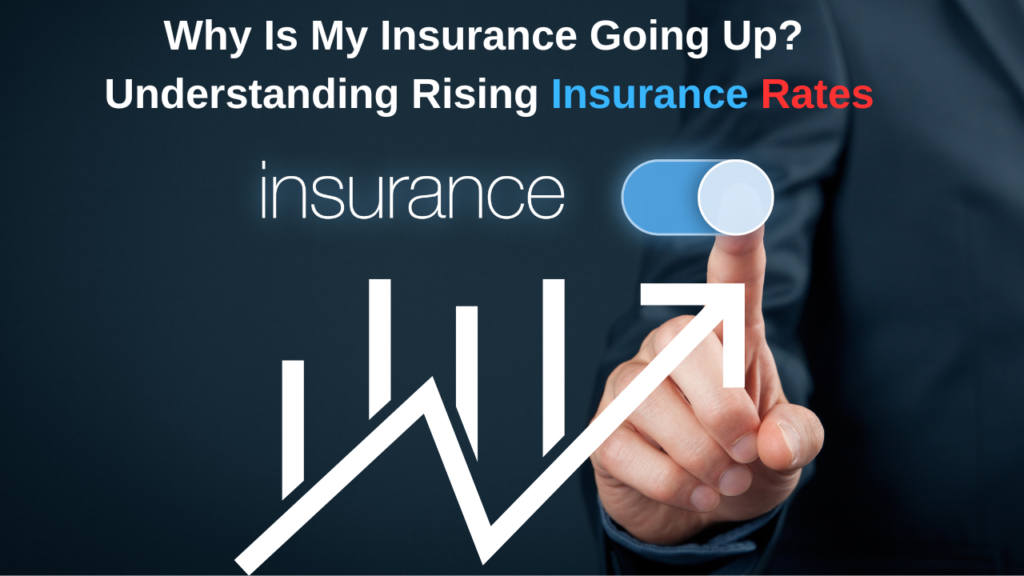If you’ve noticed a spike in your insurance premiums
, you’re not alone. Many people are asking, “Why is my car insurance going up?”
or “Why did my home insurance increase?”
even if they haven’t filed an insurance claim.
Insurance rate hikes can feel frustrating—especially when you haven’t had an accident, filed a claim, or made any major changes. In this article, we’ll break down the top reasons insurance rates are rising
and what you can do to help manage your costs.
1. Increased Claims and Payouts Across the Industry
Even if you haven’t filed a claim
, your rates can still go up because insurance is a shared risk system.
When companies experience a higher number of claims
(from accidents, natural disasters, or theft), they adjust rates for everyone to cover those costs.
🔍 Examples of events that lead to higher claims:
- Severe weather
(hurricanes, wildfires, floods) causing massive home & auto damage - More accidents on the road
, leading to increased payouts for auto claims - Rising medical costs
, making injury-related claims more expensive
- If you haven’t had a claim, ask about safe driver discounts or bundling options
to offset increases. - Consider raising your deductible
to lower your premium.
Here’s the updated section with your requested change:
2. Inflation and Rising Repair Costs
📈 The cost of goods and services has risen significantly in recent years.
This affects insurance rates because:
- Vehicles are becoming more advanced and costly to repair.
With modern cars packed with high-tech features—like sensors, cameras, and automated systems—we’re essentially driving computers. Repairs are more expensive because they require specialized parts and technicians with advanced training. - Home construction and repair costs
have surged due to labor shortages and material price hikes. - Medical expenses
continue to climb, increasing the cost of liability claims.
💡 Example:
If your car’s bumper has built-in sensors for lane detection or parking assistance, a minor fender-bender could now cost thousands of dollars to repair—driving up insurance costs.
- Ask your broker to shop around for competitive insurance quotes
if your renewal rate increases significantly. - Have your broker look into usage-based insurance programs
that adjust your rates based on your actual driving habits.
3. More Frequent and Severe Natural Disasters
Climate change has led to more catastrophic weather events
, causing billions of dollars in insured losses. Homeowners and auto insurers raise rates to cover these increased risks.
🌪️ Common weather-related claims:
- Hail and wind damage
- Flooding from hurricanes and heavy storms
- Wildfires destroying homes and vehicles
- Ask your broker about discounts
for home upgrades, such as impact-resistant roofing or flood protection. - Consider higher deductibles
for natural disaster coverage to keep premiums lower.
4. More Accidents and Risky Driving Behaviors
🚗 Auto insurance rates are climbing because accident rates are increasing.
Factors like distracted driving, speeding, and reckless behavior
have led to more severe crashes, resulting in larger claim payouts.
- More people speeding and driving recklessly
post-pandemic. - Distracted driving (texting, phone use)
is a leading cause of accidents. - Higher traffic congestion
in cities means more accidents overall.
- Sign up for safe driving discounts
or telematics programs that track your driving habits. - Take a defensive driving course
for potential rate reductions.
5. Fraud and Insurance Scams
Unfortunately, insurance fraud
is a major issue that affects everyone. Fraudulent claims, staged accidents, and exaggerated damages force insurance companies to increase rates
to offset their losses.
💰 Common types of fraud that drive up rates:
- Staged car accidents
where fraudsters fake collisions to collect payouts. - Exaggerated claims
where policyholders inflate damage costs. - Fake injury claims
that increase medical and liability costs.
- Report suspicious claims
to your insurance broker or provider. - Be cautious of “too good to be true” accident claims
from third parties.
6. Your Personal Insurance History
Your individual profile
plays a big role in determining your rates. If your insurance has increased, it may be due to:
- A past claim
(even if it was small, it could affect your renewal rate). - A change in credit score
(in some states, insurers factor this into pricing). - Your location
(moving to a high-risk area can cause an increase).
- If your credit score improved, ask your insurance broker or provider for a re-evaluation
. - Ask your broker to shop around for better rates
from different insurance providers.
How to Lower Your Insurance Costs
Even if rates are going up, there are still ways to lower your premiums
and make insurance more affordable:
✔️ Bundle your home and auto insurance
– Many providers offer discounts for multiple policies.
✔️ Increase your deductible
– A higher deductible means lower monthly payments.
✔️ Take advantage of discounts
– Ask about good driver, low-mileage, or homeowner discounts.
✔️ Improve your credit score
– Some states allow insurers to use credit in pricing.
✔️ Shop around
– Your broker is the best way to compare rates from multiple insurance providers to find the best deal for you.
✔️ Use telematics programs
– Some insurers offer usage-based pricing for safe drivers.
Final Thoughts: Stay Informed and Proactive
Insurance rates are rising due to economic factors, increased claims, severe weather, and industry-wide risks
—but you can take steps to minimize your costs
.
✔️ Stay aware of market trends.
✔️ Ask your provider about new discounts and programs
.
✔️ Compare insurance providers regularly.
By understanding why your insurance is increasing
, you can make informed decisions and find ways to keep your coverage affordable without sacrificing protection.
Have questions about your insurance rates? Contact Vargas & Vargas Insurance at 617-298-0655 for a personalized review and expert advice!

